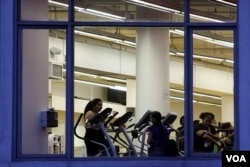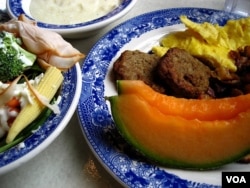“To butt or not to butt enhance, is the question,” screamed the headline on Zimbabwe’s Herald newspaper.
I gasped, and then slapped my forehead. Really, Herald? Are you kidding me?
The article turned out to be about the allure and dangers of pills like Apetito tablets, appetite stimulants that claim to enhance the hips and butt, and cause general weight gain. In Zimbabwe, as in many parts of Africa, a woman with a heavy behind, large rounded hips and a well-defined bust is the epitome of true beauty.
Reading about Apetito brought back memories of loved ones who, with my best interests at heart, urged me to take the tablets so that I would not look like a “typical emaciated African kid” when I got to America.
Weight gain, you see, is considered a good thing. It is a symbol of prosperity and a sign that in the prevalent harsh HIV climate, one has managed to not only be of good health, but even to gain weight. It is a sign that, in these days of food shortages, one has managed to sustain oneself so well that it shows through your general appearance. In men, weight is a sign of affluence, especially if one has a potbelly. My friend Bothwell often refers to the belly as a “success curve” - the steeper the gradient, the higher the level of affluence.
With all this in mind, you can imagine my shock when I came to the U.S. and found out that not only do people not make an effort to gain weight, they actually sweat and starve to stave off weight gain. Acai Berry weight loss tablets and not Apetito, are what women go for here.
During my freshman year, I watched with undisguised fascination as my friends would eat not to fill their stomachs, but to ensure that they had just barely met their daily calorie requirement. I also remember, vividly, watching helplessly as my American roommate’s face clouded over when I “complimented” her that she had gained weight (as you may have guessed, in America this is not a compliment).
I, on the other hand, would approach all of my meals with the same enthusiasm with which I would attack mounds of sadza, the staple food, back at home. It is with this same appreciation for food that I attended the numerous food-themed study-breaks, ice-cream socials and candy give-away events on campus that are meant to engage freshmen in on-campus activities.
That freshman version of me would die a sad death if she found out how often I now make my way to the gym under the pretext of working off the “Freshman 15,” or how I longingly eye the dessert stand while making my way to the salad bar.
I learned, through several pounds gain and consequent reduction in dancing abilities, that American meals are to be approached with great caution. Generally speaking, American food undergoes greater degrees of processing, has more oil and is more fat-inducing compared to the organic food at home. Most of what looks like healthy food in the dining hall, like green beans for example, is rarely in the same naturally fresh state that you would have it at home.
Obesity is actually one of the major challenges that the United States is facing. In Zimbabwe, people who cannot afford to have a nutritious diet are generally thin. In America, however, poor people are normally able to afford cheap fast foods, which have higher levels of cholesterol and fats, and therefore are more likely to suffer from obesity.
And so, as I head on to the salad bar with thoughts of working out on my mind, I deny any allegations that I might have conformed to Americanization. Having been exposed to statistics on obesity, a huge problem in America and many other developed countries (and increasingly some developing ones as well), I choose to exercise caution, and join in the American battle against obesity.
I gasped, and then slapped my forehead. Really, Herald? Are you kidding me?
The article turned out to be about the allure and dangers of pills like Apetito tablets, appetite stimulants that claim to enhance the hips and butt, and cause general weight gain. In Zimbabwe, as in many parts of Africa, a woman with a heavy behind, large rounded hips and a well-defined bust is the epitome of true beauty.
Reading about Apetito brought back memories of loved ones who, with my best interests at heart, urged me to take the tablets so that I would not look like a “typical emaciated African kid” when I got to America.
Weight gain, you see, is considered a good thing. It is a symbol of prosperity and a sign that in the prevalent harsh HIV climate, one has managed to not only be of good health, but even to gain weight. It is a sign that, in these days of food shortages, one has managed to sustain oneself so well that it shows through your general appearance. In men, weight is a sign of affluence, especially if one has a potbelly. My friend Bothwell often refers to the belly as a “success curve” - the steeper the gradient, the higher the level of affluence.
With all this in mind, you can imagine my shock when I came to the U.S. and found out that not only do people not make an effort to gain weight, they actually sweat and starve to stave off weight gain. Acai Berry weight loss tablets and not Apetito, are what women go for here.
During my freshman year, I watched with undisguised fascination as my friends would eat not to fill their stomachs, but to ensure that they had just barely met their daily calorie requirement. I also remember, vividly, watching helplessly as my American roommate’s face clouded over when I “complimented” her that she had gained weight (as you may have guessed, in America this is not a compliment).
I, on the other hand, would approach all of my meals with the same enthusiasm with which I would attack mounds of sadza, the staple food, back at home. It is with this same appreciation for food that I attended the numerous food-themed study-breaks, ice-cream socials and candy give-away events on campus that are meant to engage freshmen in on-campus activities.
That freshman version of me would die a sad death if she found out how often I now make my way to the gym under the pretext of working off the “Freshman 15,” or how I longingly eye the dessert stand while making my way to the salad bar.
I learned, through several pounds gain and consequent reduction in dancing abilities, that American meals are to be approached with great caution. Generally speaking, American food undergoes greater degrees of processing, has more oil and is more fat-inducing compared to the organic food at home. Most of what looks like healthy food in the dining hall, like green beans for example, is rarely in the same naturally fresh state that you would have it at home.
Obesity is actually one of the major challenges that the United States is facing. In Zimbabwe, people who cannot afford to have a nutritious diet are generally thin. In America, however, poor people are normally able to afford cheap fast foods, which have higher levels of cholesterol and fats, and therefore are more likely to suffer from obesity.
And so, as I head on to the salad bar with thoughts of working out on my mind, I deny any allegations that I might have conformed to Americanization. Having been exposed to statistics on obesity, a huge problem in America and many other developed countries (and increasingly some developing ones as well), I choose to exercise caution, and join in the American battle against obesity.





